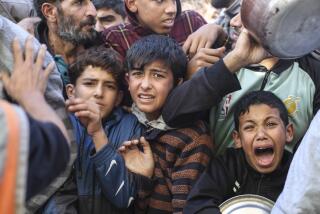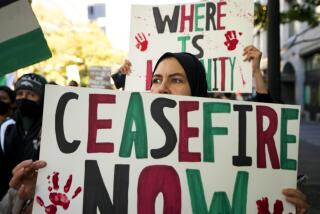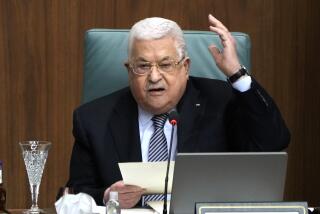NEWS ANALYSIS : Arafat Forced to Shift Focus, Pacify Militants : Mideast: PLO chairman orders release of some jailed Palestinian leaders. Move is likely to anger Israelis.
JERUSALEM — The bloody clash between Palestinian police and Islamic militants in Gaza last week has forced Yasser Arafat to shift his attention from peacemaking with Israel to peacemaking with the Palestinian opposition.
Arafat, head of the Palestinian self-governing authority, on Sunday ordered the release of some leaders of the militant Islamic Jihad movement from Palestinian jails. The releases appeared to be a conciliatory gesture meant to help defuse tensions between the Palestinian Authority and the movement.
They are likely to infuriate Israeli officials, who have warned Arafat that his failure to quell attacks on Israelis by Islamic Jihad and another Islamic organization, Hamas, is jeopardizing the Israeli-Palestinian peace accord.
Israeli Prime Minister Yitzhak Rabin has said that Arafat must choose between peace with Israel and peace with the Islamic militants.
But for Arafat, the choice is not nearly so clear-cut. He is exercising limited authority, with a puny budget, in Gaza, where Hamas and Islamic Jihad enjoy their greatest popularity.
Many Palestinians who do not agree with the tactics of the Islamic militants nonetheless sympathize with their opposition to the Israeli-Palestinian accords and respect their strict adherence to Islam. Palestinians also fear that any crackdown on the Islamic militants might lead to civil war.
Until Friday, when Palestinian police shot dead at least 13 people--unofficial Palestinian sources said 18 died--and wounded at least 129 more in running gun battles with militants, Arafat had carefully refrained from any armed confrontation with Islamic Jihad or Hamas. He still appears to be more interested in politically co-opting them than in crushing them.
Arafat’s decision to start releasing Islamic Jihad leaders came after Palestinian mediators worked out a truce Friday night between the Palestinian police and the militants. The mediators are now trying to extend that truce and to fashion a broader political accord between Arafat’s government and the militants.
The fundamentalists made the release of prisoners one of their conditions of reconciliation with the Palestinian Authority.
Tension between the Palestinian Authority and Islamic militants had been mounting for weeks, with the militants staging a series of deadly attacks on Israelis and vowing to torpedo the Israeli-Palestinian peace accord.
A week ago, Palestinian police arrested about 120 Islamic Jihad members after a suicide bomber from the group blew himself up at an Israeli checkpoint near the Jewish settlement of Netzarim in Gaza, killing three Israeli soldiers. No one has been charged in that attack. Palestinian police arrested 300 more Islamic activists in Gaza on Friday.
But the problem facing Arafat is that the Islamic militants consider their attacks against Israelis a sacred mission that they will continue despite any reconciliation with the Palestinian Authority.
Saturday night, another Israeli soldier--26-year-old reserve Sgt. Gil Dadon--was killed in a drive-by shooting at the Netzarim checkpoint. Israel again demanded that the Palestinian Authority apprehend the attackers, and it beefed up its presence around settlements in Gaza and throughout the West Bank.
“We are all now facing a crossroads,” said Joel Singer, the Foreign Ministry’s legal adviser and one of the drafters of the Israeli-Palestinian peace framework. “This junction we are at with the Palestinians may lead us down the drain or facilitate the beginning of our climbing toward a more stable peace.”
In an interview at his office Sunday, Singer repeatedly accused the Palestinian Authority of violating its agreements with Israel. Most dangerous to the process, Singer said, is the Palestinian Authority’s inability to curb attacks on Israeli soldiers and civilians.
“Arafat and the PLO promised us that they would take control in Gaza and that they would disarm the armed bands. They have not done that,” said Singer, a key player in Israel’s ongoing negotiations with the Palestinians over extending self-rule throughout the West Bank.
“For the common Israeli, everything else is much less significant than the security situation. The Palestinian Authority must take control of the security situation,” Singer said. “Maybe we are reaching a point where the whole thing will collapse because the process will lose the support of the two sides.”
But Arafat is under pressure from Palestinians to stop rounding up Islamic militants every time Israelis are attacked. That pressure is bound to increase after Friday’s clashes, which many Palestinians blamed on the Palestinian police.
“Nobody can violently suppress these demonstrations by the Islamists without becoming some sort of dictatorial rule,” said Ziad abu Amr, a political science professor at Birzeit University in the West Bank.
More to Read
Sign up for Essential California
The most important California stories and recommendations in your inbox every morning.
You may occasionally receive promotional content from the Los Angeles Times.










